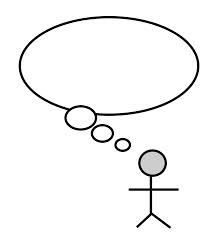记忆方法
“thought"是由"think"的过去式和过去分词形式演变而来,“think"意为"思考”,那么"thought"就可以理解为"思考的结果”,即"想法"或"思想"
中文词源
thought 思想,想法,主意
来自 think 的名词形式,-th,名词后缀,在 h 后缩写为 t.
英语词源
- thought
-
thought: [OE] Thought comes from a prehistoric Germanic noun *gathangkht-, which was formed from the same base as produced English think. Its modern Germanic relatives include German gedächtnis ‘memory’ and Dutch gedachte ‘thought’.
=> thank, think - thought (n.)
- Old English þoht, geþoht "process of thinking, a thought; compassion," from stem of þencan "to conceive of in the mind, consider" (see think). Cognate with the second element in German Gedächtnis "memory," Andacht "attention, devotion," Bedacht "consideration, deliberation." Second thought "later consideration" is recorded from 1640s. Thought-crime is from "Nineteen Eighty-Four" (1949); thought police is attested from 1945, originally in reference to war-time Japanese Special Higher Police (Tokubetsu Koto Keisatsu).
权威例句
- 1. I thought I'd enrol you with an art group at the school.
- 我想我会吸收你参加学校的一个艺术团。
- 2. I thought you might like to read the enclosed.
- 我想你或许想要读一下信封里的内容。
- 3. "Wait there!" Kathryn rose. "No, on second thought, follow me."
- “在那儿等着!”凯瑟琳站起身来,“不,我改主意了。跟我来。”
- 4. I thought, "Here'ssomeone who'll understand me." So I wrote to her.
- 我想:“这个人会理解我的。”于是开始给她写信。
- 5. I thought a phonetic spelling might aid in pronunciation.
- 我想语音拼写可能有助于发音。

